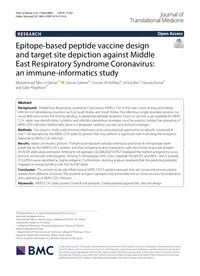
2019 Epitope_based peptide vaccine design and target site depiction against Middle East Respiratory Syndrome Coronavirus PDF
Preview 2019 Epitope_based peptide vaccine design and target site depiction against Middle East Respiratory Syndrome Coronavirus
Tahir ul Qamar et al. J Transl Med (2019) 17:362 https://doi.org/10.1186/s12967-019-2116-8 RESEARCH Epitope‐based peptide vaccine design and target site depiction against Middle East Respiratory Syndrome Coronavirus: an immune-informatics study Muhammad Tahir ul Qamar1*† , Saman Saleem3†, Usman Ali Ashfaq3†, Amna Bari1, Farooq Anwar4 and Safar Alqahtani2* Abstract Background: Middle East Respiratory Syndrome Coronavirus (MERS-COV) is the main cause of lung and kidney infections in developing countries such as Saudi Arabia and South Korea. This infectious single-stranded, positive (+) sense RNA virus enters the host by binding to dipeptidyl-peptide receptors. Since no vaccine is yet available for MERS- COV, rapid case identification, isolation, and infection prevention strategies must be used to combat the spreading of MERS-COV infection. Additionally, there is a desperate need for vaccines and antiviral strategies. Methods: The present study used immuno-informatics and computational approaches to identify conserved B- and T cell epitopes for the MERS-COV spike (S) protein that may perform a significant role in eliciting the resistance response to MERS-COV infection. Results: Many conserved cytotoxic T-lymphocyte epitopes and discontinuous and linear B-cell epitopes were predicted for the MERS-COV S protein, and their antigenicity and interactions with the human leukocyte antigen (HLA) B7 allele were estimated. Among B-cell epitopes, QLQMGFGITVQYGT displayed the highest antigenicity-score, and was immensely immunogenic. Among T-cell epitopes, MHC class-I peptide YKLQPLTFL and MHC class-II peptide YCILEPRSG were identified as highly antigenic. Furthermore, docking analyses revealed that the predicted peptides engaged in strong bonding with the HLA-B7 allele. Conclusion: The present study identified several MERS-COV S protein epitopes that are conserved among various isolates from different countries. The putative antigenic epitopes may prove effective as novel vaccines for eradication and combating of MERS-COV infection. Keywords: MERS-COV, Spike protein, T-and B-cell epitopes, Computational approaches, Vaccine design © The Author(s) 2019. This article is distributed under the terms of the Creative Commons Attribution 4.0 International License (http://creat iveco mmons .org/licen ses/by/4.0/), which permits unrestricted use, distribution, and reproduction in any medium, provided you give appropriate credit to the original author(s) and the source, provide a link to the Creative Commons license, and indicate if changes were made. The Creative Commons Public Domain Dedication waiver (http://creativecommons.org/ publicdomain/zero/1.0/) applies to the data made available in this article, unless otherwise stated. Open Access Journal of Translational Medicine *Correspondence:
